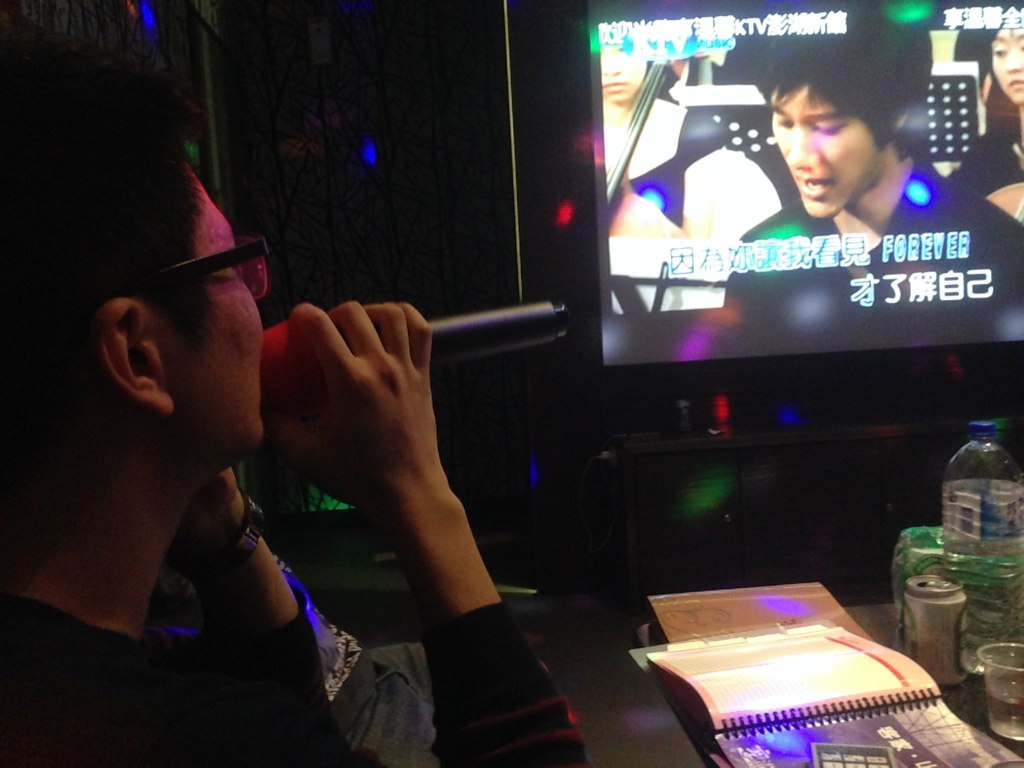If you’ve been learning Mandarin for a while, then you probably know a thing or two about KTV. You probably know that
KTV stands for Karaoke Television
and is popular not just in China but in many countries across Asia. You
may also know it differs vastly from Western-style karaoke where you
are typically invited onstage to sing your favorite songs in front of an
audience of strangers. Does that sound intimidating? Well lay your
worries to rest: KTV is not designed to test your inner stage-fright
limits. Instead, it involves booking your own private room with your
best friends or colleagues, and singing to your heart’s content for as
long as you desire (with some booze involved, if that’s your thing)
whether it’s just for one hour or an all night-long marathon session.
More often than not, Mandarin learners who do not feel confident in
their language or singing ability tend to decline offers to go to KTV.
By doing so, you are shutting yourself out of a culturally important
(and fun!) activity and an excellent opportunity to improve their
Mandarin language skills. But have no fear: as the ever popular
Taiwanese group May Day (五月天) famously sang “Wǒ bù yuàn ràng nǐ yīgè
rén|
我不愿让你一个人”
| I won’t leave you on your own any longer when it comes to KTV. Read
more for the 3 things you need to know to optimize your next KTV
experience.

KTV Buildings are often identifiable by their gaudy neon light displays.
For the local Chinese, KTV represents a great way to unwind, be it
after a stressful workweek, a study break from exams, or just a way to
get together with your friends and socialize. However, for the foreigner
studying Chinese, an evening out at KTV may not be the relaxing
experience your Chinese friends envisioned when they invited you.
Instead, the thought of singing songs in a second language may bring
more anxiety than relaxation. Will you be able to read the characters
fast enough on the screen when your favorite song comes on? Will your
Chinese friends think your voice is unbearable, while you’ve been told
that just about every Chinese person can sing like a rock-star?
1. Do your homework before you
go. Familiarize yourself with a few Mandarin songs and I guarantee your
night will be that much more fun.
Perhaps you’ve been invited to KTV with your Chinese friends or
colleagues. In the past you may have come up with excuses for why you
were unable to make it, like “
I really can’t sing!”
Alternatively, maybe you’ve attended in the past but never found the
courage to go about singing a song entirely in Mandarin. Regardless of
which category you fall into, doing some “homework” before your night
out may sound ridiculous, but I guarantee it will make your evening more
enjoyable. Becoming familiar with a couple popular Mandarin songs will
allow you to take part in the singing, or at the very least, recognize
songs your friends sing. You may not be aware, but as you are doing your
“homework”, most likely, so are your local Chinese friends. It’s very
common to practice songs before heading out to KTV. Two popular KTV apps
are “Chàng ba”|
唱吧
| Just Sing, which also allows you to record your songs but is only
available in China, or “K gē dá rén” | K歌达人, which is available outside
of China.
If you aim to master one Mandarin song each time you go to KTV, over
time, the “collection” of songs you are able to sing will grow and as it
does, you will find the KTV experience more and more enjoyable. Pick
songs that are both popular and easy to learn. The legendary Taiwanese
singer, Teresa Teng’s(邓丽君) Tiánmì mì |
甜蜜蜜
is the ultimate Mandarin song that every foreigner should learn, and
one which every Chinese person–young or old–will gleefully join in and
sing along. The lyrics to this song are repetitive which makes it an
easy first song to master. Check out some other popular songs that are
great for Mandarin learners at the end of this article.
2. Follow proper KTV Etiquette.
Yes, just like other activities in any culture, such as dining out or
visiting someone’s home, there is an unspoken etiquette that should be
followed at KTV. In my experience, I have come to realize two good
etiquette rules to follow:

Don’t hog the microphone! Be sure to let everyone get their turn.
First, do not be a Mài bà|麦霸 -a.k.a. mic hog. This Mandarin term
refers to people who continuously have the microphone in their hand,
queuing up song after song in a row without care or regard for the other
singers in the room. They are also notorious for
cutting a song at KTV, so they can sing the song they want. This is a big no-no!
I would also discourage you do opposite – going to KTV but not
singing once. This may lead your friends to feel worried you are not
enjoying yourself, especially if they were the ones who invited you. Not
partaking in the activity of the evening will likely result in a less
enjoyable time for all. For this reason, try singing the song you
practiced at home, and if you’re feeling nervous, consider turning on
the original voice in the background (called yuán chàng | 原唱). Fill in
the rest of the night with the English songs you know and love. As you
learn more, the number of English songs you sing will slowly reduce and
the number of Mandarin songs will increase.
The second etiquette rule to remember is that KTV is a social event.
Don’t feel the need to offer your undivided attention to every singer
throughout the night; feel free to chat with your friends while others
are singing and don’t forget to end the night with a popular song that
speaks of friendship and unity. As Wakin Chau’s (周華健) classic hit
“Péngyǒu |
朋友”
goes: “Péngyǒu yī shēng yīqǐ zǒu…. yī jù huà, yī bēi jiǔ|朋友一生一起走 ….
一句话,一杯酒”, you may form long-lasting friendships that started out with a
simple song.
3. “Wǒ méiyǒu zhè zhǒng tiān fèn|我没有这种天分” ! Don’t worry if you’re not a good singer!

It doesn’t matter if you can’t sing – KTV will be a fun time, regardless.
While Jay Chou (周杰伦) famously belted out these words in his hit song Ānjìng|
安静,
thankfully in the context of KTV, it’s completely ok if you’re lacking
musical talent. Don’t worry about being a good singer. I can’t stress
this enough. As someone who has never been very musical myself, I can
honestly say that talent does not define the level of enjoyment KTV has
to offer. Remember KTV for a Mandarin learner is more about singing the
song
successfully than it is about singing the song
well.
Success for a Mandarin learner simply means able to read all the
characters correctly and fast enough to keep up with the pace of the
song. By doing this, you will greatly impress your fellow Chinese
speakers. Remember, foreigners get off easy for singing Chinese songs
off key–At leastI have always gone by this rule.
As someone who was once shy to go to KTV, I have learnt the above
three guidelines firsthand and gradually discovered a love for KTV. Next
time you’re invited out for an evening of singing, try following these
three simple rules and I guarantee you will impress not only your
friends but yourself as well. Take this important step forward into
embracing Chinese culture through one of the best ways possible: music.
Useful Mandarin phrases for KTV:
- 订个包厢 / 房间 - Book a KTV room
- 点歌 - “order” a song
- 切歌 - “cut”a song
- 原唱 – Option to sing with the original singer’s voice in the background
- 伴唱 – Option to sing without the original singer’s voice
- 男歌星/女歌星/ 乐队组: Select Male, female, or group singers
Additional KTV songs for the Mandarin Learner:
Male:男歌手
- Ài wǒ bié zǒu | 爱我别走 by 张震岳 Chang Chen-yue
- Zàijiàn|再见 by张震岳 Chang Chen-yue
- Duìmiàn de nǚhái kàn guòlái |对面的女孩看过来 by 任贤齐 Richie Ren
- Háishì huì|还是会 by 韋禮安 Wei Li-an
- Qíng fēiděi yǐ| 情非得已 by庾澄慶 Harlem Yu
Female:女歌手
- Dào dài | 倒带by蔡依林 Jolin Tsai
- Yuèliàng dàibiǎo wǒ de xīn |月亮代表我的心 by邓丽君 Teresa Teng
- Hǎo yǎnlèi huài yǎnlèi|好眼泪坏眼泪 by 徐若瑄 Vivian Hsu
- Yǐnxíng de chìbǎng | 隐形的翅膀by 张韶涵 Angela Zhang
- Kěxí bùshì nǐ | 可惜不是妳by 梁静茹 Fish Leong
And if you’re feeling adventurous, try this popular duet with a friend:
- Yīnwèi àiqíng|因为爱情 by 陳奕迅 (Eason Chan) & 王菲 (Faye Wong)
Also, if you have a subscription to Spotify, we’ve put together this
handy playlist for you (*note: some of the songs by the original singers
weren’t available, so we have subbed them out for different singers) :
There is one other way you can really
boost your language skills so you’re fully prepped for your next KTV
session: a subscription to ChinesePod! With over 3,600 lessons (and
twenty devoted to KTV alone!) you’ll be equipped with the language you
need to conquer whatever situation you may run into.
Resource:chinesepod.com


